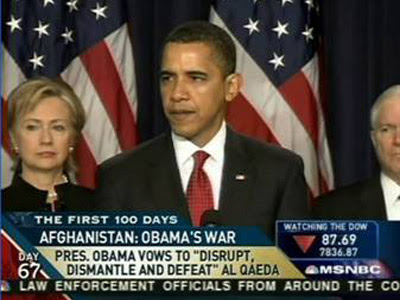
Iranian foreign minister Ali Larijani cited recent American actions in Afghanistan as similar to mistakes that the United States made in Vietnam decades earlier. Larijani also noted the former Soviet Union's failure to achieve its goals in Afghanistan in the 1980's as well as evidence that foreigners cannot win wars in Afghanistan.
You would expect nothing less from a senior Iranian official, but he has a point, one that many observers and analysts have been trying to make since President Barack Obama changed American policy and strategy in Afghanistan to one that has almost no chance of success. The combination of an ill-defined mission and the wrong strategy to achieve it, combined with the refusal to adequately resource the deployed forces is a recipe for disaster. What the President is doing in South Asia could be the template for a Foreign Policy Failures for Dummies book.
First, let's dispel ourselves of the Obama-perpetuated myth that the mission in Afghanistan is to "disrupt, dismantle and defeat" al-Qa'idah. Even Obama's CIA director Leon Panetta has publicly stated that there are likely no more than 100 al-Qa'idah combatants in Afghanistan. So please stop insulting our intelligence by clinging to that outright falsehood. Al-Qa'idah is gone from Afghanistan. They are still a lethal organization that needs to be eliminated, yes, but THEY ARE NOT IN AFGHANISTAN. Someone explained to me using all upper case letters was the same as shouting. Yes, I am shouting.
So where are al-Qa'idah's fighters? As American forces removed the Taliban from power in 2001, al-Qa'idah was forced to flee to Pakistan - Usama bin Ladin slipped through our fingers during the fighting at Tora Bora. After their arrival in Pakistan, they regrouped in time to transfer many of the organization's fighters to Iraq after the American invasion in 2003. Once in Iraq, they entered into an alliance with Sunni groups involved in the insurgency and created "al-Qa'idah in Mesoptamia."
After the American troop surge in 2007 and the associated "Anbar Awakening" that saw many of the Sunni leaders turn on al-Qa'idah, the group was decimated and forced to move south to Yemen. Moving to Saudi Arabia was no longer possible after the group foolishly attacked Saudi installations soon after the insurgency began in Iraq. The Saudis, who had up until then turned a blind eye to the group being in the kingdom, turned on the group and hunted them down - very effectively. The remnants of the group fled to Yemen as well.
Mr. President, if you really want to - in your own words - "disrupt, dismantle and defeat" al-Qa'idah, you have to go where they are. That is Pakistan and Yemen. I acknowledge that you are doing the right thing in these two countries - the drone-launched missile attacks in Pakistan and providing support to Yemeni forces are excellent tactics. That said, you must also acknowledge that al-Qa'idah is not in Afghanistan to the level that warrants the deployment of over 100,000 American troops.
However, if the United States is going to continue to fight in Afghanistan and wants to be successful, it must change how it conducts the war. The single most important thing President Obama can do is to publicly repeal his politically-motivated, ill-advised artificial withdrawal date of July 2011. Virtually every military officer, except maybe those beholden to the Obama administration, knows defining withdrawal dates is a bad idea.
More importantly, the Karzai government and the Taliban also know it is a bad idea - in July 2011, both know that the Taliban will still be there. All they have to do is survive until then. Karzai must be concerned that he will have no protection and may seek an accommodation with the Taliban as we draw closer to the day the Americans have decided to end their war, to in essence "declare victory and go home."
Second, the rules of engagement have to be altered to take advantage of American strengths and Taliban weaknesses. The reluctance to use overwhelming air power is a mistake - we have ample evidence that both al-Qa'idah and the Taliban fear air attacks, as well they should. However, the current restrictions on the effective use of this asset puts American and coalition troops at greater risk. I understand the sensitivity to "collateral damage" - military-speak for civilian deaths - but at some point you owe it to your troops to err on their side.
While we think that these restrictions, the restraint so much called for by the administration, are a sign of strength, the Taliban sees them as a sign of weakness. They have adapted their tactics to the rules of engagement - they know them and use them against us. The way to defeat the Taliban is to hunt them down relentlessly and kill them - kill many of them. That they understand - that they regard as strength. You cannot reason with them, for they are the "true believers" in their cause - they have to be defeated, and defeat among true believers comes only with death. One only need look a the numbers of former Guantanamo inmates that we find on the battlefield again to realize that.
The American military is a powerful, fearsome force - if allowed to be. What we are doing is hamstringing our troops and their leaders. Larijani is right - we are making the same mistakes we made in Vietnam. Hopefully, with General Petraeus now in charge in Afghanistan, he can convince the President that he should seek victory, not withdrawal.

.jpg)
